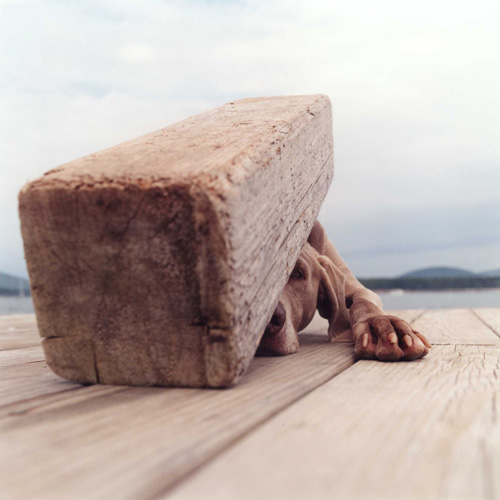
Galerie Bugdahn und Kaimer Düsseldorfer Straße 6 40545 Düsseldorf Allemagne
WILLIAM WEGMAN "DOGS ON ROCKS - IN THE WOODS - AT THE SEASIDE"
Following our exhibitions of photo pieces and Polaroids by William Wegman (*1943) in the years 1995, 1997 and 2004, and of drawings in 2007, Galerie Bugdahn und Kaimer now presents a series of new coloured photographic works by this American, New York-based conceptual artist who is equally at home in the media of painting, drawing, video, film and photography.
The photographs shown in the exhibition "Dogs on Rocks - in the Woods - at the Seaside" are Chromogenic prints, 14 x 11 inches / 35.5 x 28 cm, made in an edition of twelve. Most were taken on Baker's Island, on Wellington Dock in Southwest Harbor, and in a few other places nearby on the Maine coast during late July and August. They span a period of ten years and include six dogs from four generations: Chundo, Batty, Chip, Bobbin, Candy and Penny.
A hardbound Artist's Book, William Wegman: Dogs On Rocks, is just out, with 136 pages and 86 colour plates, and is available at the exhibition.
Wegman's name is linked inseparably with his photographs of Weimaraner dogs. He first became known for cryptically ironic photographic and video works (with and without dogs); but in the 1970s he attained world renown when he discovered the talents of his first Weimaraner dog, Man Ray, as a gifted model and an ideal interpreter of human idiosyncrasies. As Wegman recalls, some dogs dislike being stared at; but Man Ray insisted on it.
In 1979, the Polaroid Corporation invited the artist to work with a newly developed camera, the now legendary Polaroid 24 x 20 Inches (60 x 50 cm). Sceptical at first, Wegman familiarised himself with the enormous instrument that looked like a cross between a refrigerator and a cello, as he put it, and soon found himself enthusing over the unusual picture scale. The outcome was a remarkable oeuvre of singularly sharp, large-scale photographs, each a unique piece, as only this Polaroid camera - one of only three in existence worldwide - can produce.
In 1981, Man Ray died. Only in 1986 was he succeeded by Fay Ray, a born dog diva with no less flair. Fay opened the door to altogether new motifs. She could move gracefully, assume different positions and poses, arch her neck, turn her head round, cross her legs. She liked to impress him, Wegman says. Meanwhile the fifth generation of her offspring pose in front of the camera.
William Wegman is a master in his handling of the photographic medium, versed in generating from the interplay with his dogs one new, startling pictorial idea after the other, sublime in quality and originality. Many of his photographs have the air of paintings and recall subtle still life compositions and film sequences. Apart from which his Weimaraners remain unsurpassed in beauty, expressive power and elegance.
Photographs by Wegman can be seen in exhibitions in museums and international galleries the world over and have entered all the larger collections. Numerous retrospectives have been devoted to his work, touring the U.S. to stop at many venues including the Whitney Museum of American Art in New York, and beyond, in Japan, Korea and Europe.
Besides film segments regularly featured since 1989 in Sesame Street, Wegman has also made films and videos for such programmes as Saturday Night Live and Nickelodeon. His film, The Hardly Boys in Hardly Gold, was shown to great acclaim at the Sundance Film Festival.
Today William Wegman and his Weimaraners are amongst the most popular figures on the international art and media scene.

